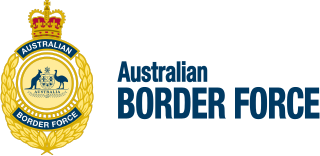 W
WThe Australian Border Force (ABF) is a law enforcement agency, part of the Department of Home Affairs, responsible for offshore and onshore border control enforcement, investigations, compliance and detention operations in Australia.
 W
WThe Voluntary Militia for National Security, commonly called the Blackshirts or squadristi, was originally the paramilitary wing of the National Fascist Party, known as the Squadrismo, and after 1923 an all-volunteer militia of the Kingdom of Italy under Fascist rule, similar to the SA. Its members were distinguished by their black uniforms and their loyalty to Benito Mussolini, the Duce (leader) of Fascism, to whom they swore an oath. The founders of the paramilitary groups were nationalist intellectuals, former army officers and young landowners opposing peasants' and country labourers' unions. Their methods became harsher as Mussolini's power grew, and they used violence and intimidation against Mussolini's opponents. In 1943, following the fall of the Fascist regime, the MVSN was integrated into the Royal Italian Army and disbanded.
 W
WThe Border Service of the National Security Committee of the Republic of Kazakhstan is a governmental paramilitary forces that manages the international borders of Kazakhstan. August 18 is celebrated as the Day of the Border Troops, which is the professional holiday of the Border service.
 W
WThe Civilian Irregular Defense Group program was a program developed by the U.S. government in the Vietnam War to develop South Vietnamese irregular military units from minority populations.
 W
WThe Federal Reserve Unit, or better known by the abbreviation as FRU, is a riot control force and a paramilitary special response team that can be deployed at any time to engage in any emergency or public unrest in Malaysia.
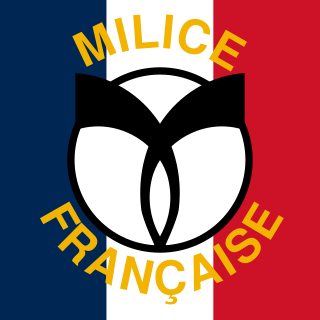 W
WThe Franc-Garde was the armed wing of the French Milice (Militia), operating alone or alongside German forces in major battles against the Maquis from late 1943 to August 1944.
 W
WThe General Service Unit (GSU) is a paramilitary wing in the Kenya Police Service, consisting of highly trained police officers, transported by seven dedicated Cessnas and three Bell helicopters. Having been in existence since 1948, the GSU has fought in a number of conflicts in and around Kenya, including the 1963 – 1969 Shifta War and the 1982 Kenyan coup.
 W
WThe Ministry of Internal Affairs, commonly referred to as INTAF, was a cabinet ministry of the Rhodesian government. One of Rhodesia's most important governmental departments, it was responsible for the welfare and development of the black African rural population. It played a significant role maintaining control of rural African villages during the Rhodesian Bush War.
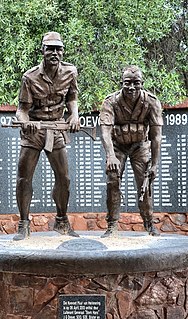 W
WKoevoet was the counter-insurgency branch of the South West African Police (SWAPOL). Its formations included white South African police officers, usually seconded from the South African Security Branch or Special Task Force, and black volunteers from Ovamboland. Koevoet was patterned after the Selous Scouts, a multiracial Rhodesian military unit which specialised in counter-insurgency operations. Its title was an allusion to the metaphor of "prying" insurgents from the civilian population.
 W
WThe Moldovan Border Police also commonly known as the Moldovan Frontier Police is the official paramilitary border guard of the Republic of Moldova. It is currently a department of the Ministry of Internal Affairs (MAI) and exercises its powers and policy in the accordance with the ministry. It was originally founded as the Border Guard Troops, and later the Border Guard Service of the Armed Forces of the Republic of Moldova. It would remain a military branch until a 2012 government reform, putting it under the control of the MAI. The Day of the Border Police is celebrated annually on 10 June.
 W
WThe National Police Reserve , or NPR, was a lightly armed national police force established in August 1950 during the Allied occupation of Japan. In October 1952, it was expanded to 110,000 men and renamed as the National Safety Force. On July 1, 1954, it was reorganized as the Japan Ground Self-Defense Force (JGSDF).
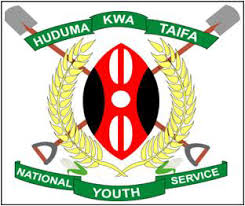 W
WThe National Youth Service (NYS) is an organisation under the Government of Kenya. It was established in 1964 to train young people in important national matters. In 2019, the organization was transformed from a state department to a fully fledged semi-autonomous state corporation after enactment of NYS act, 2018] by the Kenyan parliament.
 W
WThe Palestinian National Security Forces are the paramilitary security forces of the Palestinian National Authority. The name may either refer to all National Security Forces, including some special services but not including the Interior Security Forces, the Presidential Guard and General Intelligence, or refer to the main force within the National Security Forces.
 W
WThe Patriotic Guards were Romanian paramilitary formations formed during the Communist era, designed to provide additional defence in case of a foreign attack.
 W
WThe Chinese People's Armed Police Force is a Chinese paramilitary organization primarily responsible for internal security, riot control, counter-terrorism, disaster response, law enforcement and maritime rights protection as well as providing support to the PLA Ground Force (PLAGF) during wartime.
 W
WThe Razakars were a private militia organised by Qasim Razvi during the rule of Nizam Mir Mir Osman Ali Khan, Asaf Jah VII. They resisted the integration of Hyderabad State into the Dominion of India. They also had plans to make the Nizam accede his princely state to Pakistan instead of India. Eventually, the Indian Army routed the Razakars during Operation Polo. Qasim Razvi was initially jailed and then allowed to move to Pakistan where he was granted asylum, on an undertaking that he would migrate to Pakistan within forty-eight hours of his release.
 W
WThe Registered Cossacks of the Russian Federation are a Cossack paramilitary formation that also performs non-military state services, on the basis of the Federal Law of the Russian Federation dated December 5, 2005 № 154-FZ "On State Service of the Russian Cossacks".
 W
WThe Sarandoy or Sarondoy were a militarized gendarmerie force of the Soviet-backed Democratic Republic of Afghanistan in the 1980s, during the Soviet–Afghan War.
 W
WThe Security Battalions (Greek: Τάγματα Ασφαλείας, romanized: Tagmata Asfaleias, derisively known as Germanotsoliades or Tagmatasfalites were Greek collaborationist military groups, formed during the Axis occupation of Greece during World War II in order to support the German occupation troops.
 W
WSpecial Task Force On Organised Crime (STAFOC) are the specialized operation armed response units of the Royal Malaysia Police.
 W
WThe State Border Committee of the Republic of Belarus, GPK manages the international borders of Belarus. Its armed paramilitary force is known as the Border Guard Service, It carries out committee orders and policy. The service covers the borders with Russia, Ukraine, Poland, Lithuania and Latvia.
 W
WThe Border Guard Service of the State Committee for National Security of the Kyrgyz Republic also commonly known as the Kyrgyz Frontier Force is the border guard of the Kyrgyz Republic. It is currently a Public Service department of the government of the republic and is not part of any ministries.
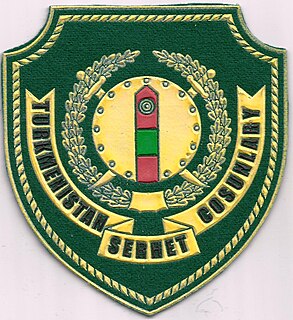 W
WThe State Border Service (SBS) also commonly known by its paramilitary force as the Turkmen Border Troops is a border guard agency of the Armed Forces of Turkmenistan. It is currently a public service department of the government of the country and is under the command of the Ministry for National Security of Turkmenistan.
 W
WStatspolitiet was from 1941 to 1945 a National Socialist armed police force that consisted of Norwegian officials after Nazi German pattern. It operated independently of the ordinary Norwegian police. The force was established on June 1, 1941 during the German occupation of Norway. The initiative for the force came from the later chief Karl Marthinsen and other prominent members of the collaborationist party Nasjonal Samling. At its peak, in 1944 there were 350 employees in Statspolitiet, in addition to a larger number who collaborated or rendered services for them. Its purpose was primarily to combat so-called political crimes, refugees, espionage, sabotage, armed resistance and other kinds of resistance against the German occupation forces or the Norwegian collaborationist Quisling regime. Statspolitiet played an important role during the Holocaust in Norway, aiding in the deportation of the Jews in Norway. Norwegians were arrested by contemporary laws, and many were later sent to prison camps in Norway and concentration camps in what was then Germany. Statspolitiet was organized with a headquarters in Oslo and six subsidiaries in Oslo and Aker, Stavanger, Bergen, Trondheim, Tromsø and Kirkenes. Statspolitiet was subordinate to the chief of the security police and the Norwegian Minister of Police, Jonas Lie. Statspolitiet also received orders directly from the Reich Main Security Office. The general of Statspolitiet, Karl A Marthinsen was liquidated by the Norwegian resistance movement on 8 February 1945. This caused massive reprisals, in which 34 imprisoned resistance fighters were executed at Akershus Fortress.
 W
WThe Tonton Macoute or simply the Macoute was a special operations unit within the Haitian paramilitary force created in 1959 by dictator François "Papa Doc" Duvalier. In 1970 the militia was renamed the Volontaires de la Sécurité Nationale. Haitians named this force after the Haitian mythological bogeyman, Tonton Macoute, who kidnaps and punishes unruly children by snaring them in a gunny sack and carrying them off to be consumed at breakfast.
 W
WThe National Guard of the Republic of Uzbekistan is a uniformed independent formation within the Armed Forces of the Republic of Uzbekistan. The headquarters of the National Guard is based in Tashkent, where most of the 30,000 soldiers that make up the force are located. As of 2020, the individual in charge of the UNG is currently Rustam Jo'raev. He succeeded Colonel General Bakhodir Tashmatov and Botir Tursunov.
 W
WVillage guards, officially known as Türkiye Güvenlik Köy Korucuları, are Gendarmerie General Command-aligned Border guards involved in the Kurdish-Turkish conflict, mostly Kurds but also Circassians, Turks, Uzbeks and Kyrgyz people. Originally they were set up and funded by the Turkish state in the mid-1980s under the direction of Turgut Özal. Their stated purpose was to act as a local militia in towns and villages, protecting against attacks and reprisals from the insurgents of the Kurdistan Workers Party (PKK). The rationale behind the establishment of the village guards was that it would be helpful to the Turkish Army to have an additional force of people who knew Southeastern Anatolia Region and the language in order to assist in military operations against the PKK. In 2019, the force consisted of approximately 54,000 village guards in total.
 W
WThe Xinjiang Production and Construction Corps, also known as XPCC or Bingtuan, is a unique state-owned economic and paramilitary organization in the Xinjiang Uyghur Autonomous Region (XUAR) of China. The XPCC has administrative authority over several medium-sized cities as well as settlements and farms in Xinjiang. It has its own administrative structure, fulfilling governmental functions such as healthcare, policing, judiciary, and education for areas under its jurisdiction. Nominally subject to the XUAR, its internal affairs, including the administration of its cities and reclaimed land, is separate from that of the Autonomous Region and under direct control of the central government. The XPCC has been described to operate as a state within a state.